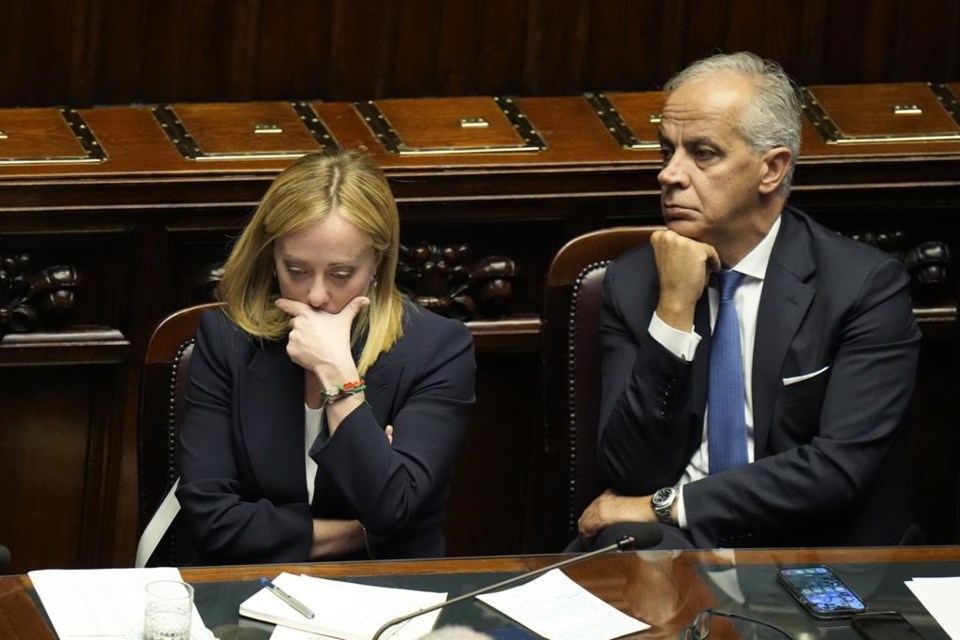MILAN (AP) — Italian Premier Giorgia Meloni on Wednesday defended her government against criticism that a decree banning rave parties could be used to clamp down on sit-ins and other forms of protest while a march by thousands of fascist sympathizers to the crypt of the country's slain fascist dictator went unchallenged.
The decree on illegal raves was among the first actions of Meloni’s far-right-led government. Both the political opposition and judicial magistrates voiced alarm that the tough law-and-order stance signaled the government's possible intolerance of disobedience.
Critics noted that no action was taken against the weekend march by several thousand admirers of the late Italian dictator Benito Mussolini wearing fascist symbols and singing colonial-era hymns in Predappio, Mussolini's birth and burial place, while the government in Rome took extraordinary action to break up a rave party in the northern city of Modena.
“We will never deny anyone the right to express dissent,''Meloni said in a Facebook post, accusing those suggesting that might be the case of ”instrumentalization."
She said the decree was necessary “after years in which the government has bowed its head in the face of illegality." When property is occupied without authorization and drug use and sales are prevalent, “it is right to prosecute illegal raves," Meloni said.
She did not address the criticism over the handling of the rave versus the march by fascist sympathizers.
Earlier, Interior Minister Matteo Piantedosi told Italian newspaper Corriere della Sera that he deplored “in the most absolute way” the march held Sunday in Predappio marking the 100th anniversary of the March on Rome that ushered in two decades of fascist rule. Still, he dismissed the event as a “clownish” stunt.
He said similar gatherings had happened throughout the years “without trouble and under control of police,” and that any acts that violated Italian laws criminalizing apology of fascism would be turned over to magistrates.
“We live in a democratic country with solid institutions and a constitution in which all political parties are recognized. We have the antibodies to defeat whoever wants to go in another direction,’’ Piantedosi said.
Meloni’s government is the first led by a party with neo-fascist roots since Mussolini’s fascist dictatorship was ousted during World War II, ending a disastrous alliance with Hitler's Germany.
Meloni has tried to chart a moderate course, seeking to distance her Brothers of Italy party from its neo-fascist origins and denouncing Mussolini's racial laws that sent thousands of Italian Jews to Nazi death camps. But many remain concerned about the more militant pasts of the premier and some of the ministers serving in her government.
Speaking to Corriere della Sera, Piantedosi denied that the decree targeting illegal raves would be used in other contexts, calling such suggestions “offensive.”
The decree, which still must be debated and approved by parliament to become law, would make the organizers of unauthorized gatherings of more than 50 people in public or private settings eligible for prosecution and prison terms of up to six years.
According to legal experts, the decree cites the presence of 50 people for creating a “gathering,” a term which could be applied to political, union or even sporting events. An expert in criminal law at the University of Bologna, Vittorio Manes, told Italian newspaper Quotidiano Nazionale the measure was “extremely generic and therefore slippery,″
Italy's Constitution allows limits on the right to assembly “only for proven reasons of public safety and security,” and does not discuss threats to order or public health — the rationales cited in the decree, Giovanni Maria Flick, a former president of Italy's constitutional court, told daily newspaper La Repubblica.
Flick said the government's drawing up a new law looked especially heavy-handed when existing statutes could be applied to break up rave parties.
Concerns were accentuated by a police action last week to break up a student protest against a meeting at a Rome university that included a lawmaker from Meloni’s party. Video showed riot police blocking students who had protested behind a banner reading: “Fascists out.”
Asked whether force was necessary in that case, Piantedosi told Corriere that he could not second-guess “the professionality and the sensitivity of those in the field who have to make decisions in a few seconds.”
The decree was approved Monday as some 2,000 young people from throughout Europe gathered in the northern Italian city of Modena for a rave in an abandoned warehouse. Authorities said the warehouse was dangerous and risked collapsing from loud music vibrations. They also cited the impact on traffic.
Event participants abandoned the site when instructed.
Colleen Barry, The Associated Press



